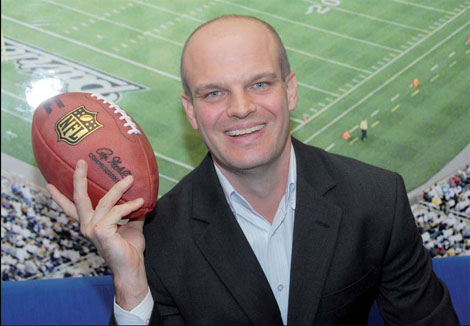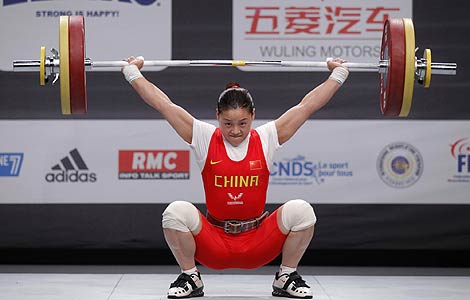Having a ball
Updated: 2011-11-11 07:42
By Todd Balazovic (China Daily)
|
|||||||||
|
Richard Young is managing director of NFL China and has won over more than 1 million Chinese football fans. [Geng Feifei / China Daily] |
Promoter enjoys spreading the football gospel to a new Army of NFL supporters
As the National Football League (NFL) reaches the midpoint of the season, millions of Americans have been nestling into their favorite armchairs, cracking a beer and tuning into one of their nation's most popular televised sports.
But ask a Chinese person when the time they last watched the Steelers cross the goal line, however, and the result will most likely be a confused stare.
If Arizona-native Richard Young has his way, the internationally obscure sport will soon become the same televised phenomenon that already has most American families flocking to the sofa every Sunday. Minus the nachos.
A veteran of Chinese sports television, Young recently stepped into the role as managing director of NFL China where he's been pitted with the daunting task of tackling their share of China's ballooning sports audience. Fortunately, he is armed with what he calls one of the world's most TV friendly sports.
"I genuinely believe in the product, it's built for television. It has drama, it has intensity and it does both with regularity. You have that 'OK here we go' moment on every play," Young says.
The 41-year-old has spent a better part of the two decades bringing televised sports to China, working with ESPN and Star Live TV before launching his own sports firm, self-named Young Consulting.
He settled in as managing director making his of NFL, one of the United States' most recognized sports franchises, last December.
He says the work has been tough.
Even though China can physically compete on even ground in almost any sport, his biggest challenge is facing the lack of spectator culture, unlike those in the West.
He says while Chinese fans avidly back their home teams, in the Super League, China's premier soccer league, the turnout for Beijing versus Shanghai games is astonishing, but fans rarely show interest if their province or city isn't involved.
"In the US, someone from LA may watch the Boston Red Socks play the New York Yankees simply because they love the game," he says. "That's the real challenge for the development of sports, getting people to want to watch the game rather than just the teams they love."
He attributes America's love of the game to the solid business foundation in the US.
"There is certainly something in the American culture, and I am very slow to call something cultural, that lends itself to sports."
"The difference between the US and other countries, especially in China, is that there is a proper business landscape for sports in the US, the industry has certainly evolved since I got in the business. You can now get sports management bachelors and graduate degrees.
"It is such a huge business in the US that it is I think it may be the path with which many other countries are following. But I'm not 100 percent sure that this is the cultural path that other countries, especially China, are following."
While the going may be difficult and China's interest in American football fairly new, Young is confident in the sport's rising interest. He said the number of people interested in the NFL is very low with less than 1 percent of China's population watching NFL, compared 24 percent listing it as their favorite sport in the US.
But through grassroots marketing they have managed to accumulate an estimated 1 million enthusiastic fans, he says.
"The percentage may be low, but the sheer scale of things in China means that getting even one percent of people watching is a large number."
By promoting flag football, a non-contact alternative to the sport with relatively low equipment costs, Young and other enthusiasts have managed to establish more than 44 teams at universities nationwide.
It is these teams that will help garner interest in American football for the new generation of football fans, he says.
"We have numerous programs that reach into the community here, but where we need the assistance is with a bit more acceptance inside the sports community. Here in China - and pushing to have flag football is part of that."
And while Young now spends his days convincing others of the virtues of American football he admits his own participation in the sport during high school proved that he was "far more enthusiastic about sports than talented in them".
It was his enthusiasm for sports that prompted a friend to ask Young for help set up a local tennis tournament while he was studying in Taiwan.
Excited to get involved, he gladly accepted and the tournament was a smashing success.
Not too soon after, the friend, who was leaving for another job, asked a 21-year-old Young to take over his job, unwittingly jumpstarting his career in China's yet-to-develop sports industry.
For the next five years Young learned the sports industry from the ground up from "cleaning out the lockers to carrying the water, to selling the programs overseas to major networks." He received a top to bottom crash course in how to operate as a sport manager in Asia.
"From the ground up, I learned everything from the inside out - it's been more valuable than any of my direct schooling or things I've learned from books. The experience was invaluable. Anyone looking to get into the sports business should look at it that way," he says.
Coupled with his solid grasp of reading, writing and speaking Mandarin, Young's talents were quickly recruited by ESPN where he spent almost a decade operating in Hong Kong and Singapore for the US largest sports television network.
But it wasn't until 2005 after flying from Hong Kong to Beijing for a business meeting that was cancelled last minute that he saw the real potential in China's capital.
Having time to kill until his next appointment, Young wandered the same streets he used to tred as a college student 10 years before. Seeing the vast changes that had beset Beijing, he knew that it would soon be a city of global spotlight.
"I was just amazed. I made the decision and thought 'look, if this is the amount of change that happen in just 10 years, imagine what the next 10 years will be like'"
"I needed to be a part of it," he says.
So, Young launched his own consulting firm. Dealing with NFL as well as other big named clients looking to break into China's soon-to-be blooming sports market before finally being hired by NFL in December 2009.
Now, even as he faces the hurdle of changing the way Chinese view sports, Young says he is glad to part of such an interesting period of China's growth.
"I like the Chinese culture. I speak the language. For me not being in Beijing seems like having tickets to the Playboy mansion and deciding not to go."












